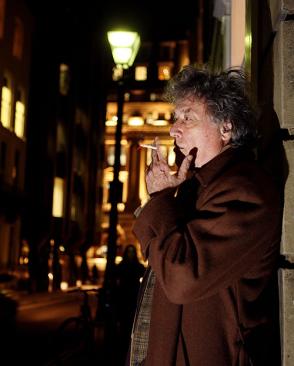 Tom Stoppard, who might just be the greatest living English-language playwright, is in Manhattan on business, and made a couple of public appearances last week. Alas, I was unavoidably elsewhere, but my friend Gwen Orel, who writes about theater and Celtic music for all sorts of publications on and off line, was present on both occasions, and filed this report.
Tom Stoppard, who might just be the greatest living English-language playwright, is in Manhattan on business, and made a couple of public appearances last week. Alas, I was unavoidably elsewhere, but my friend Gwen Orel, who writes about theater and Celtic music for all sorts of publications on and off line, was present on both occasions, and filed this report.
* * *
 Back in the twentieth century, around 1989 or so, some Serious Theatre People averred that “Tom Stoppard is over.” The Real Thing was his Tempest, they said, his farewell to the stage. Fast forward to Rough Crossing, Arcadia, The Invention of Love, The Coast of Utopia, and Rock and Roll. Some farewell! By now Stoppard, who’s in town to rehearse his new adaptation of The Cherry Orchard at BAM, has morphed into a sort of playwright-rock idol. Accordingly, he appeared in pale (though not blue) suede shoes at two public talks last week, both of them quickly overbooked. Though he was funny and charming as usual, it was fascinating to observe what a difference a moderator made.
Back in the twentieth century, around 1989 or so, some Serious Theatre People averred that “Tom Stoppard is over.” The Real Thing was his Tempest, they said, his farewell to the stage. Fast forward to Rough Crossing, Arcadia, The Invention of Love, The Coast of Utopia, and Rock and Roll. Some farewell! By now Stoppard, who’s in town to rehearse his new adaptation of The Cherry Orchard at BAM, has morphed into a sort of playwright-rock idol. Accordingly, he appeared in pale (though not blue) suede shoes at two public talks last week, both of them quickly overbooked. Though he was funny and charming as usual, it was fascinating to observe what a difference a moderator made.
At CUNY, Stoppard was joined by Nobel Prize-winning playwright Derek Walcott for a Great Issues Forum moderated by David Nasaw, the university’s Arthur M. Schlesinger, Jr. Professor of American History. The topic was “Cultural Power,” and the press release said that Stoppard & Co. would be exploring “the power of culture and art in a globalizing world.” Instead, they considered the Impact and Influence of Art. Yep, said Walcott, art’s impact cannot be easily counted and measured. Yep, said Stoppard, culture is what distinguishes us as human. All interesting, but…power?
The professor was smart but all too clearly awed by his celebrated guests, who seemed in turn to adore one another. He began, promisingly, by considering the way “the world changed last Tuesday,” showing a slide of Barack Obama with a book in his hand, which turned out to be Walcott’s Collected Poems, 1948-1984. Then the poet read us Forty Acres, his new poem about Obama, commissioned by the Times of London: Out of the turmoil emerges one emblem, an engraving –/a young Negro at dawn in straw hat and overalls,/an emblem of impossible prophecy…
Asked for his reaction, Stoppard said that the poem “silenced” him–but, of course, it hadn’t, and he self-deprecatingly remarked that he could go on “speaking like a wind-up toy.” At one point he mentioned a recent New York Times article about the New York City Opera which pointed out that the Paris Opera’s budget is larger than that of the entire National Endowment for the Arts. Provocatively, he then suggested that the patronage of the rich American may “get the government off the hook.” This was power! This was culture! This was another ball dropped.
The next day, Stoppard was interiewed at BAM by David Remnick, editor of The New Yorker and author of Lenin’s Tomb, who may be the only editor in New York who hadn’t rushed out to read Isaiah Berlin justto prepare for The Coast of Utopia. Remnick actually out-Stopparded Stoppard with his wit and erudition, and the result was a chat that unlike its predecessor was fascinating, insightful, and over too soon. When Remnick said “For our last question…” Stoppard looked at his watch and looked truly disappointed.
The topic was Chekhov, but the conversation managed to get somewhere near…well, cultural power. Asked what niche his new version of The Cherry Orchard would fill, Stoppard said that directors like to have a new text in rehearsal: “Theatre is a storytelling art form–plays are palimpsests of maps on different scales.” He was “constantly looking for that elusive place where the natural utterance functions as a narrative utterance.”
Gracefully segueing from a consideration of Solzhenitsyn and Stalin to literary influence, Stoppard described his aesthetic response to newsprint and his early ambition to be a foreign correspondent and live a glamorous life. “It can be arranged,” Remnick murmured. For once Stoppard was speechless–briefly. Remnick added, “There’s a 10 p.m. to Kabul.” Then Stoppard recovered. “The St. Tropez kind of correspondent,” he replied.
Asked how working in America was different than at home, Stoppard admitted that he was less comfortable here, explaing that there was “more a sense of heavy pressure to succeed–perhaps there’s more shame in failing than there ought to be.” (Maybe that’s because they don’t publish the West End grosses every week.)
What next? Stoppard said that he’d had just about decided to start working on a screenplay for Arcadia that he would then direct when the BBC came up with the idea of adapting some novels from the nineteenth century and the Twenties–something he says that he really wants to do. Me, I hope it’s Waugh. I can’t imagine anybody channeling the glamorous war-correspondent author of A Handful of Dust better than Tom Stoppard.
Terry Teachout on the arts in New York City
An ArtsJournal Blog
